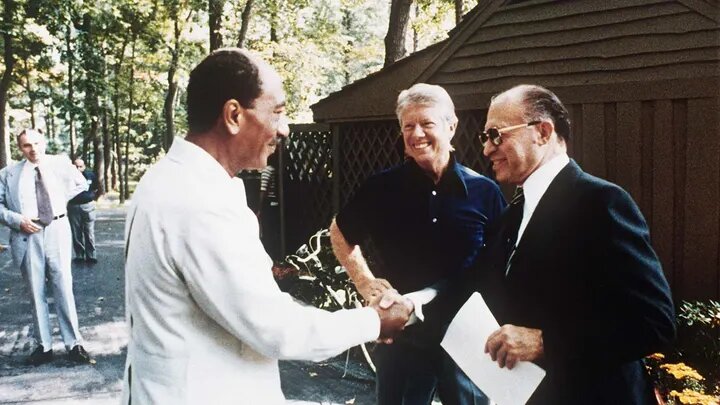Jimmy Carter Architect of normalizing Arab ties with apartheid Israel
Jimmy Carter: Architect of normalizing Arab ties with apartheid Israel
TEHRAN- As Americans mourn the death of former president Jimmy Carter, the disastrous impacts of his legacy, particularly in the Middle East are thrust into the limelight.

Carter died at the age of 100 on Sunday, forty-four years after he left the White House.
His tenure as the 39th US president began with his inauguration on January 20, 1977, and ended on January 20, 1981.
Undoubtedly, the ongoing Israeli genocide in Gaza and its brutal crimes in the West Bank, Lebanon and beyond are rooted in the policies pursued by Carter.
Abetting apartheid
Carter played a key role in aiding and abetting the Israeli apartheid regime by brokering a seemingly peace deal between Egypt and Israel in 1978.
Then Israeli prime minister Menachem Begin and then Egyptian president Anwar Sadat signed Camp David Accords on September 17, 1978, that led in the following year to a peace treaty between the two sides. The agreements became known as the Camp David Accords because the negotiations took place at the US presidential retreat at Camp David, Maryland.
Jimmy Carter brokered a seemingly peace agreement between Israel and Egypt in the late 1970s as a political ploy with the aim of encouraging Arab states to drop support for Palestine and pursue their own interests. The agreements were the first normalization deal between Israel and an Arab country.
More than four decades on, it is crystal clear that the deals were a stab in the back of Palestinians and their cause.
The Carter administration had painted a scenario to motivate Arab states to reduce their support for Palestine amid the Israeli occupation. He also wanted Arab leaders to consider their own interests separate from those of the Palestinians. So far, an overwhelming majority of the Arab public has not recognized Israel and remained opposed to normalizing ties with the regime.
Political ploy
Nonetheless, Carter’s political ploy led to the Abraham Accords. Despite rising sentiment against Israel’s atrocities against Palestinians, Donald Trump oversaw the signing of the Abraham Accords in 2020, which normalized relations between Israel and the United Arab Emirates, Bahrain as well as Morocco. Sudan joined the US-brokered deal a year later.
The normalization deals not only failed to improve the situation of Palestinians, but also strengthened Israel's resolve to intensify its apartheid practices.
With no doubts, Israel’s recent brutal war on Lebanon and the war of genocide in Gaza are the results of US-brokered normalization deals that began in the Carter era.
Proponents of Carter, who earned the Nobel Peace Prize in 2002, characterize him as a champion of peace and democracy. However, the negative consequences of his policies on the Palestinian and Lebanese populations suggest that he may be more accurately remembered as a hawkish president rather than a dovish one. An examination of his statements regarding Iran further clarifies the debate over whether he should be classified as a hawk or a dove.
Hawk or dove?
Carter served one term as president and lost his reelection bid to Ronald Reagan. His successes eclipsed at the polls by a stagnant economy and the 1979 US embassy takeover in Tehran.
Flight of fantasy: Jimmy Carter admitted in 2014 that he had been dreaming of “wiping Iran off the map”. In November 1979, a group of university students took over the US embassy in the Iranian capital. They believed Washington had turned its embassy into a center of espionage against the newly established Islamic Republic. Consequently, dozens of American diplomats were taken captive for 444 days.
Carter made futile attempts to secure the release of the Americans.
On April 25, 1980, the US revealed it had attempted a military operation known as Operation Eagle Claw to rescue the release of the captives.
But the operation failed and eight US servicemen were killed and several others were injured.
Carter explicitly demonstrated his enmity toward Iran in an interview 10 years ago.
“I could have been re-elected if I had taken military action against Iran. It would have shown that I was strong and resolute and manly. ... I could have wiped Iran off the map with the weapons that we had,” he said in a 2014 interview with CNBC.
In the interview, Carter acknowledged his aspiration to entirely obliterate Iran, yet he had found himself unable to achieve this dream either through military or political means.
source: tehrantimes.com